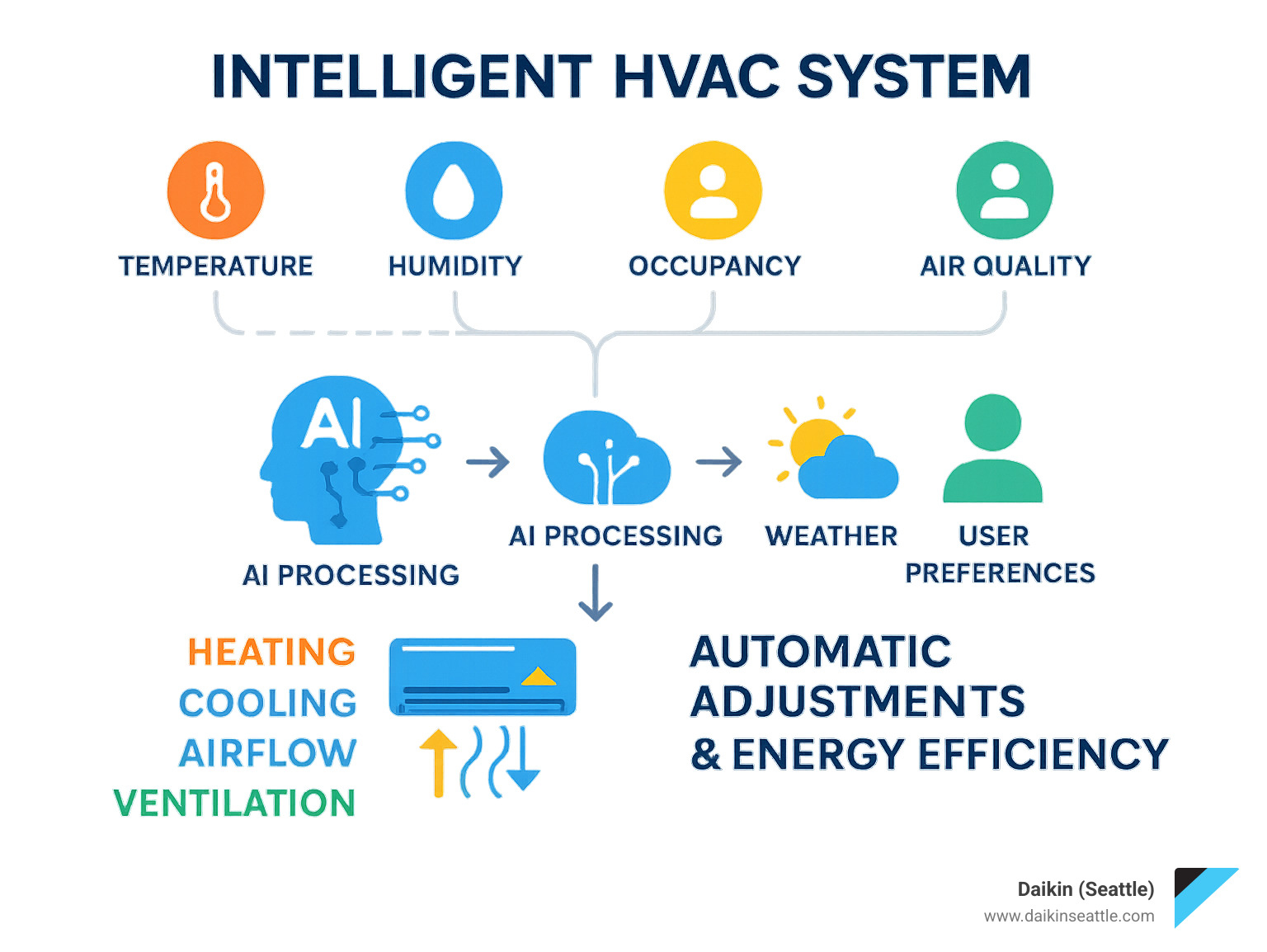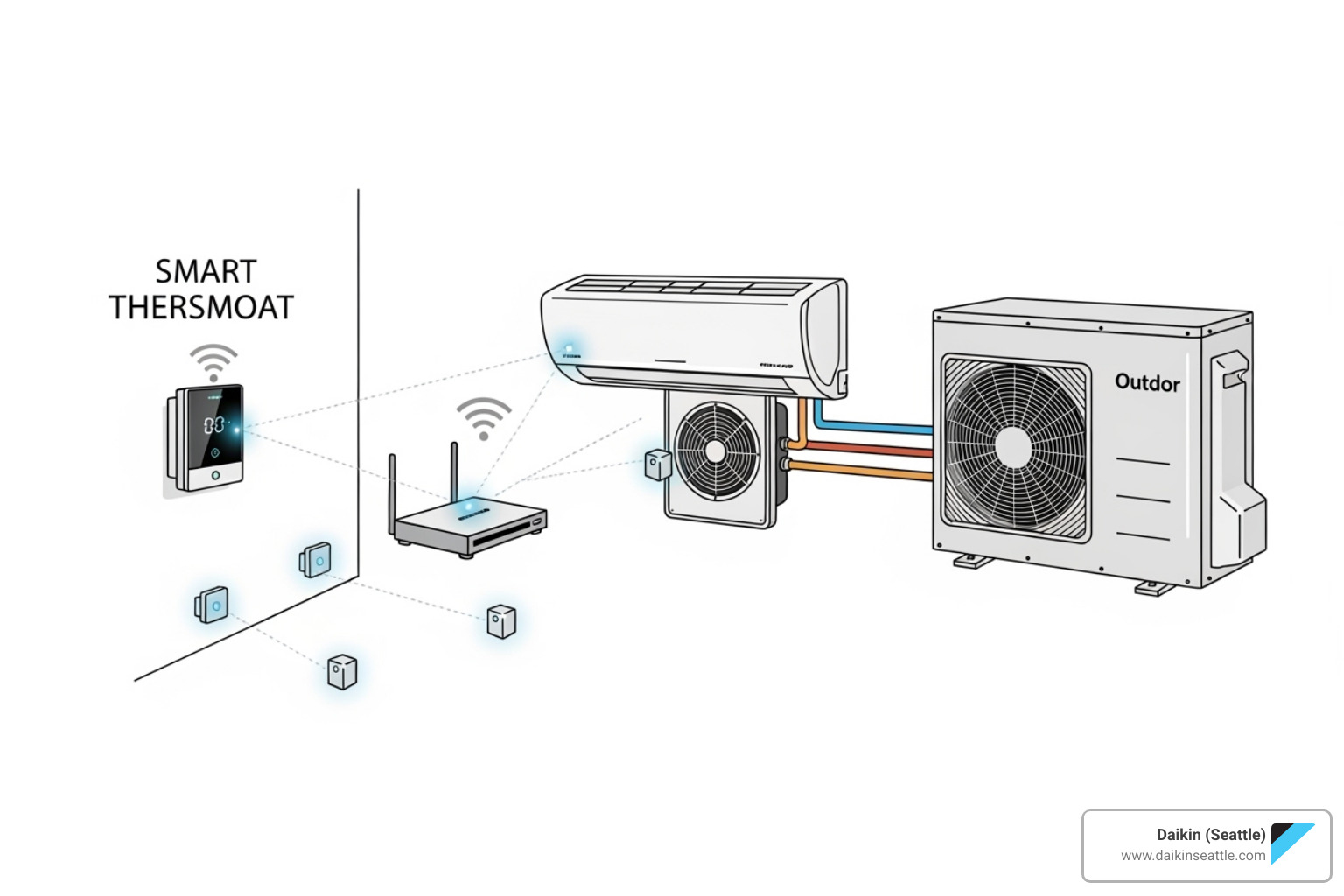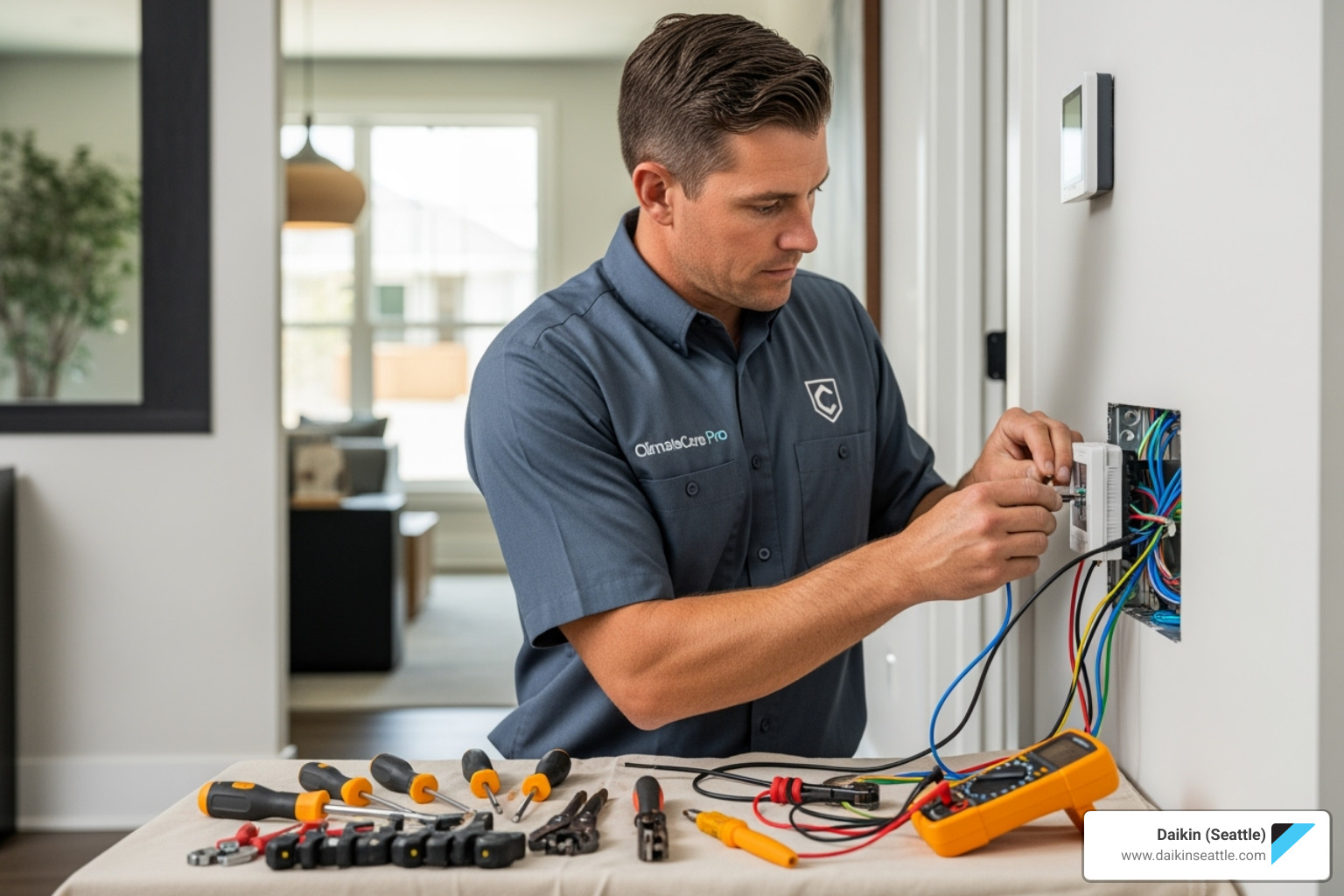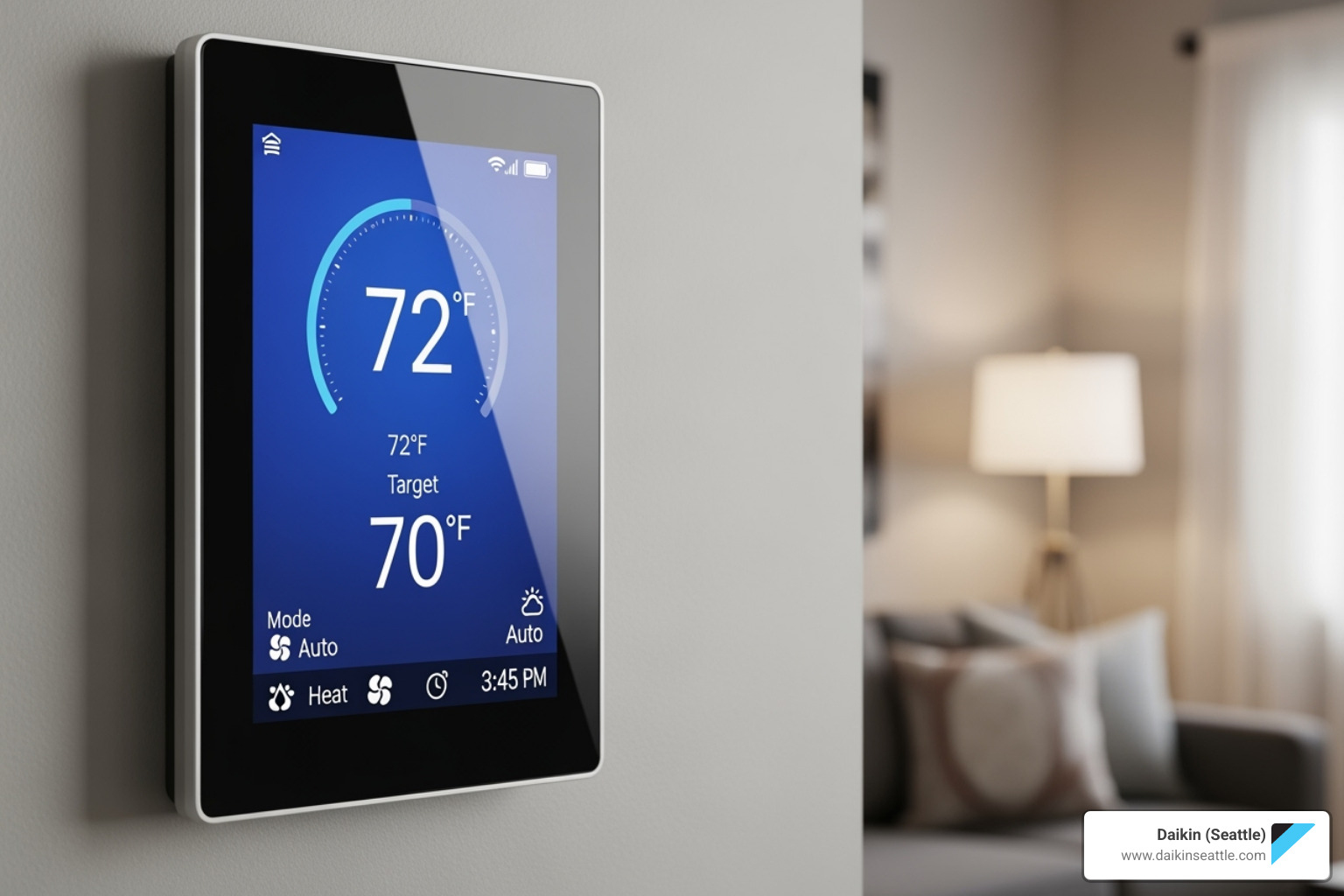Intelligent HVAC Systems: Smart 2025 Comfort
Why Intelligent HVAC Systems Are Revolutionizing Home Comfort
Intelligent HVAC systems use advanced sensors, AI algorithms, and internet connectivity to automatically optimize your home's heating, cooling, and air quality based on real-time data and learned preferences.
Key Features of Intelligent HVAC Systems:
- Smart sensors monitoring temperature, humidity, occupancy, and air quality
- AI-powered algorithms that learn your preferences and adjust automatically
- Remote control via smartphone apps and voice assistants
- Energy optimization reducing consumption by 10-30%
- Predictive maintenance to prevent breakdowns
- Multi-zone control for personalized comfort
Forget manually adjusting your thermostat or coming home to an uncomfortable house. Unlike traditional systems that just turn on and off, intelligent systems gather data from sensors, weather forecasts, and your schedule. Smart algorithms process this data to make constant, tiny adjustments.
The result is perfect comfort with maximum efficiency. Your system learns your habits—like when you cook or watch TV—and adjusts automatically. For homeowners frustrated with high energy bills and inconsistent temperatures, intelligent HVAC is a major leap forward in comfort and savings.

From Manual to Automated: The Evolution of HVAC
For most of the 20th century, traditional HVAC systems worked like simple light switches: on for heat or cooling, off when you didn't. This manual approach led to common frustrations like wasting energy on an empty house or returning to an uncomfortable temperature.
The evolution to today's intelligent HVAC systems reflects the "fourth industrial revolution"—the blend of physical machinery with digital intelligence. The real change occurred when home systems became smart enough to predict, learn, and optimize your comfort automatically, moving beyond simple reactions to temperature.
| Feature | Traditional HVAC Systems | Intelligent HVAC Systems |
|---|---|---|
| Control Method | Manual adjustments | Automated adjustments |
| Operation Style | On/Off cycles | Variable-speed operation |
| Scheduling | Fixed programs | Learns your behavior |
| Access | Wall thermostat only | Remote smartphone control |
This evolution is about creating homes that truly understand how we live.
Traditional vs. Smart HVAC: What's the Difference?
The key difference is intelligence. Traditional systems were reactive, using on-off systems that ran at full blast, causing temperature swings. Control was limited to manual thermostats on the wall, meaning the system was always playing catch-up to your needs.
Intelligent HVAC systems are proactive. They use smart thermostats with Wi-Fi connectivity for remote control from anywhere. Instead of crude on-off cycles, they use technologies like AC inverter technology to run at variable speeds. This modulates output, maintains steady temperatures, and uses less energy.
The Department of Energy notes that setting back your thermostat can save 10% annually. An intelligent system does this automatically, using features like geofencing to know when you're home or away, maximizing savings without sacrificing comfort.
Beyond the Thermostat: The Power of Integrated Intelligence
True intelligent HVAC systems go beyond just a smart thermostat. The intelligence is built directly into the equipment itself.
This system integration allows the outdoor unit, indoor unit, and HVAC circuit board to communicate and make decisions together. The system actively monitors its own performance, tracking refrigerant pressures and fan speeds, rather than just following orders from a thermostat. This smart home algorithm approach gives you freedom of choice and thermostat compatibility with a wide range of controllers, as the intelligence resides within the HVAC equipment.
The equipment gathers system-wide performance data and optimizes its operation automatically. This integrated intelligence is a key factor when exploring the most energy efficient HVAC systems, ensuring top performance and long-term satisfaction. Your system becomes a seamless part of your intelligent home, adapting to your lifestyle.
The Anatomy of a Smart System: Core Components and How They Connect
An intelligent HVAC system is an interconnected network of components communicating to optimize comfort and save energy.

At its core is the HVAC equipment (indoor/outdoor units), now equipped with smart circuit boards. The smart thermostat serves as the main interface, connecting the system to your Wi-Fi for remote control. Throughout your home, sensors monitor temperature, humidity, air quality, and occupancy.
IoT connectivity allows these components to share information instantly. For example, the system can see you're not home via your phone's location and adjust the temperature accordingly. Some setups use hubs and controllers to integrate with other smart devices, while software and apps provide a user-friendly interface for control and monitoring.
This interconnected approach is what makes these systems so smart. To see these technologies in action, explore HVAC Technologies Seattle.
The Senses of the System: The Critical Role of Sensors
Unlike older systems that relied on a single thermostat, intelligent HVAC systems use multiple sensors to understand your home's environment.
- Thermal sensors are placed in different areas to identify and eliminate hot and cold spots, ensuring consistent comfort throughout the house.
- Occupancy sensors detect when rooms are empty and automatically adjust the climate control, saving energy by not heating or cooling unused spaces.
- CO2 sensors monitor indoor air quality. Referencing research on the Impact of CO2 on cognitive function, these sensors trigger Demand Controlled Ventilation (DCV) to bring in fresh air when CO2 levels rise, creating a healthier environment.
- Humidity sensors track moisture levels to prevent the air from feeling too sticky in the summer or too dry in the winter, balancing both temperature and humidity.
- Light sensors can anticipate the need for extra cooling in sunny rooms, working with other smart devices like blinds to manage solar heat gain.
These sensors provide the detailed data needed for a truly intelligent and responsive system.
The Brains of the Operation: How AI and IoT Drive Performance
While sensors are the senses, Artificial Intelligence (AI) and the Internet of Things (IoT) are the brains of an intelligent HVAC system. IoT provides a constant stream of data—from sensors, system performance, and even local weather forecasts—to a central hub.
AI then uses machine learning to analyze this data, moving beyond simple rules to recognize patterns and adapt. Your system learns your family's routines and preferences, creating personalized comfort profiles. Predictive algorithms anticipate needs, such as pre-cooling a room before the afternoon sun hits or shifting energy use to off-peak hours to save money.
This real-time optimization constantly balances comfort, energy efficiency, and air quality. Studies show smart HVAC control performs significantly better than manual systems and can dramatically increase user satisfaction. This intelligence, paired with advanced hardware like Daikin's Inverter Technology in Air Conditioners, allows for thousands of micro-adjustments that deliver optimal comfort and efficiency.
Smarter Living: The Tangible Benefits of intelligent HVAC systems
Investing in intelligent HVAC systems provides tangible benefits that change your daily life, from monthly savings to improved comfort.

These systems help prevent unexpected breakdowns and offer significant energy savings, with the U.S. Department of Energy reporting potential reductions of 10-30%. Beyond lower utility bills, the real excitement for homeowners is the convenience and peace of mind. A vast majority of users report high satisfaction, enjoying a home that's always at the perfect temperature without any effort.
Unparalleled Comfort and Customization
Intelligent HVAC systems deliver a "just right" feeling in every room, at any time of day.
Through personalized schedules and learning, your system observes your routine and anticipates your needs, warming the house before you wake up or cooling it before bed. Geofencing uses your smartphone's location to adjust the temperature automatically when you leave or head home, saving energy without sacrificing comfort.
Multi-zone control is a game-changer for families, allowing different temperatures in different rooms to satisfy everyone's preferences. The system also manages humidity and airflow for a fresher, more comfortable environment. In commercial spaces, this customization improves employee well-being and productivity.
For those in our area, exploring Smart HVAC Systems Seattle can show you how this level of customized comfort can transform your space.
Maximizing Energy Efficiency and Cost Savings
With HVAC systems consuming 40-70% of a building's energy, smart efficiency offers major cost savings. Dynamic optimization is key; instead of running at full blast, intelligent systems make constant, tiny adjustments, using far less energy.
Variable-speed operation allows compressors and fans to run at lower speeds for longer, avoiding energy-intensive startups and providing more consistent temperatures. Some systems even use strategic load shifting, running more during off-peak hours when electricity is cheaper. This not only saves you money but also reduces your carbon footprint, contributing to a more sustainable future, as highlighted by DOE energy saving estimates.
To learn more about how these systems can benefit you, see our guide on the Energy Efficient HVAC System.
Proactive Care: Predictive Maintenance and Longevity
Intelligent HVAC systems can predict and prevent problems before they happen. Through real-time system monitoring, the unit constantly checks its own vital signs, like refrigerant pressures and motor temperatures.
Fault detection and diagnostics use AI to compare current performance against optimal parameters. If the system spots a pattern that indicates a developing issue, it flags it. You receive automated maintenance alerts on your smartphone, from simple filter change reminders to notifications that a component needs professional attention. Some systems can even notify your HVAC contractor directly.
This proactive approach dramatically reduces downtime and operational costs by fixing small issues before they become major breakdowns. Most importantly, it extends your equipment's lifespan, maximizing the value of your investment.
For expert support, our team at HVAC Solutions Seattle can help you leverage these advanced maintenance features.
Making the Switch: Key Considerations for Implementation
Embracing intelligent HVAC systems is an exciting step, but a successful upgrade requires careful planning. It's about more than a fancy thermostat; it's about a seamless integration that delivers on the promise of smart comfort. Key decisions regarding components, compatibility, and security will shape your experience for years to come.

What are the core components of intelligent HVAC systems?
When implementing a smart system, several factors are key to success:
- System Compatibility: Not all existing HVAC equipment is ready for a smart upgrade. A professional assessment is needed to determine if retrofitting is viable or if a new, fully integrated intelligent HVAC system is a better long-term investment.
- Smart Home Integration: Ensure your new HVAC system is compatible with your existing smart devices, like voice assistants or lighting, to create a cohesive ecosystem.
- Professional Installation: This is essential. Proper installation by licensed professionals guarantees optimal performance, efficiency, and safety, while also protecting your warranty.
- Cost vs. ROI: While the upfront cost is higher than for a traditional system, the long-term return on investment from energy savings, lower maintenance, and longer equipment life often makes it a financially sound choice.
Visit our Daikin Experience Center Smart HVAC Decisions in Seattle to consult with experts and find the perfect solution for your needs.
Cybersecurity in a Connected Home
As intelligent HVAC systems connect to the internet, cybersecurity is a vital consideration. Any IoT device carries potential risks, but awareness and simple precautions allow you to enjoy smart comfort with confidence.
To keep your system secure:
- Choose Reputable Brands: Select manufacturers with a strong security reputation that provide regular software updates.
- Use Strong Passwords: Create complex, unique passwords for your Wi-Fi network and all smart device accounts. Avoid default credentials.
- Install Regular Updates: Software updates often contain critical security patches to protect against new vulnerabilities.
- Consider Network Segmentation: For advanced protection, place IoT devices on a separate network from computers containing sensitive data.
- Understand Data Privacy: Review the company's privacy policy to know what data is collected and how it's used.
Taking these informed steps allows you to enjoy the benefits of a connected system with peace of mind. We can discuss these security aspects in detail for customers interested in Smart HVAC Systems Bellevue.
Conclusion: The Future of Home and Building Comfort is Intelligent
We've moved from basic on/off systems to intelligent HVAC systems that learn, anticipate, and optimize our indoor environments. The benefits are clear and compelling.
The numbers speak for themselves: with 8 out of 10 users reporting satisfaction and potential energy savings of 10-30%, the switch is an obvious choice. These systems deliver on three key promises: unparalleled comfort, significant energy savings, and proactive predictive maintenance for peace of mind. By making our buildings smarter, we also live more sustainably.
At Daikin, we are at the forefront of this revolution. Our unique Pacific Northwest Daikin Experience Center in Seattle allows you to interact with our advanced heat pumps and inverter technology firsthand. See for yourself what these systems can do for your home or business.
The future of comfort is here. These intelligent systems are empowering people across Seattle and the Pacific Northwest to live smarter and more comfortably. To begin your journey, consult with a licensed professional HVAC dealer who can guide you through a seamless installation.
Start your journey toward smarter living today. Explore how you can Upgrade your home with an indoor air quality monitor in Seattle and find what intelligent comfort can do for you.

Schedule a Visit

your individual indoor comfort needs

products firsthand

with an authorized Daikin Dealer
.webp)

.webp)

.svg)
